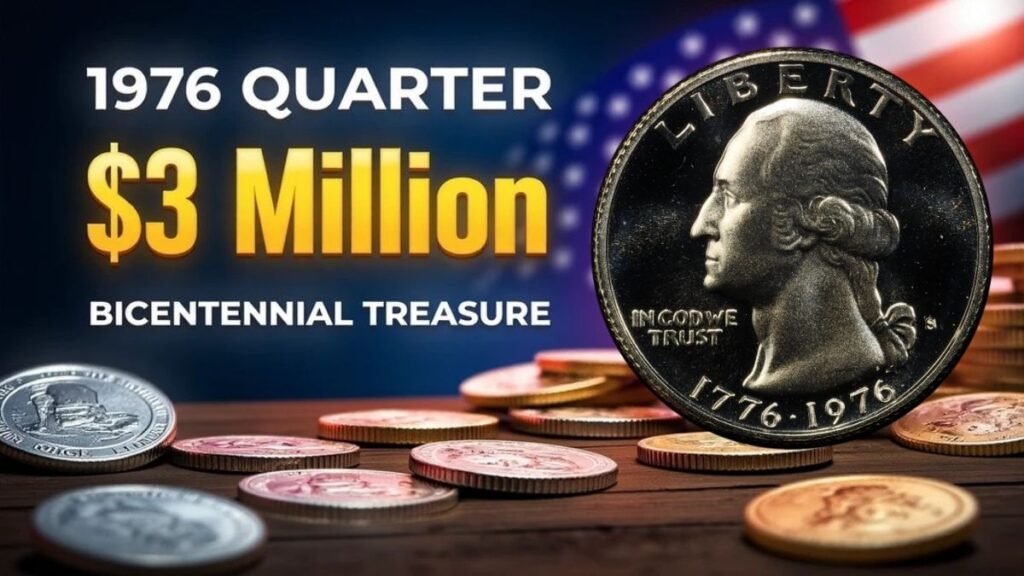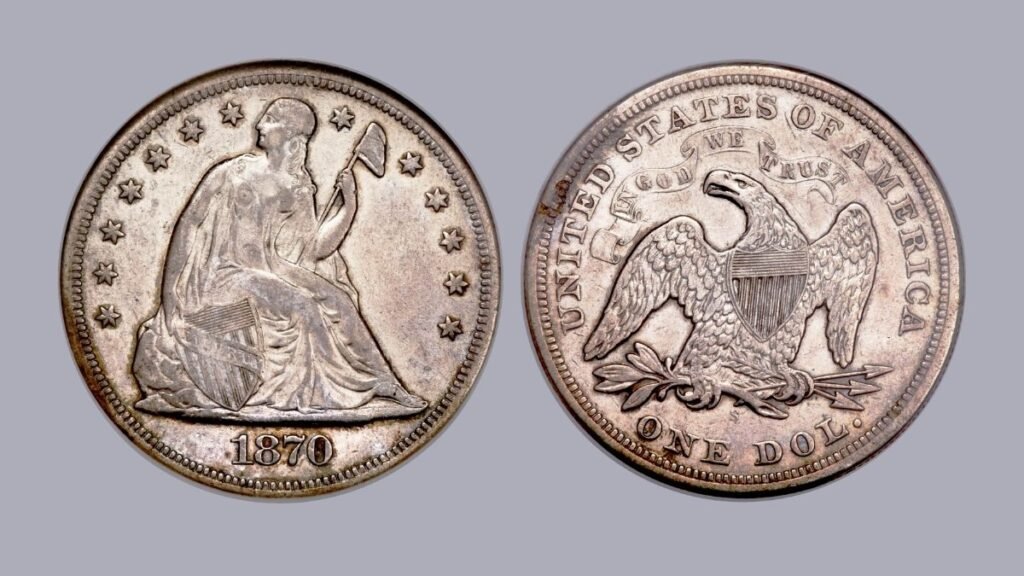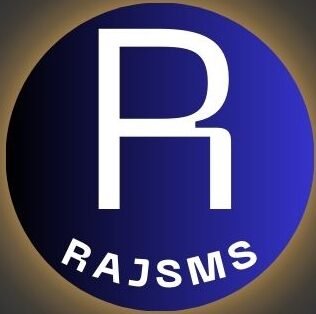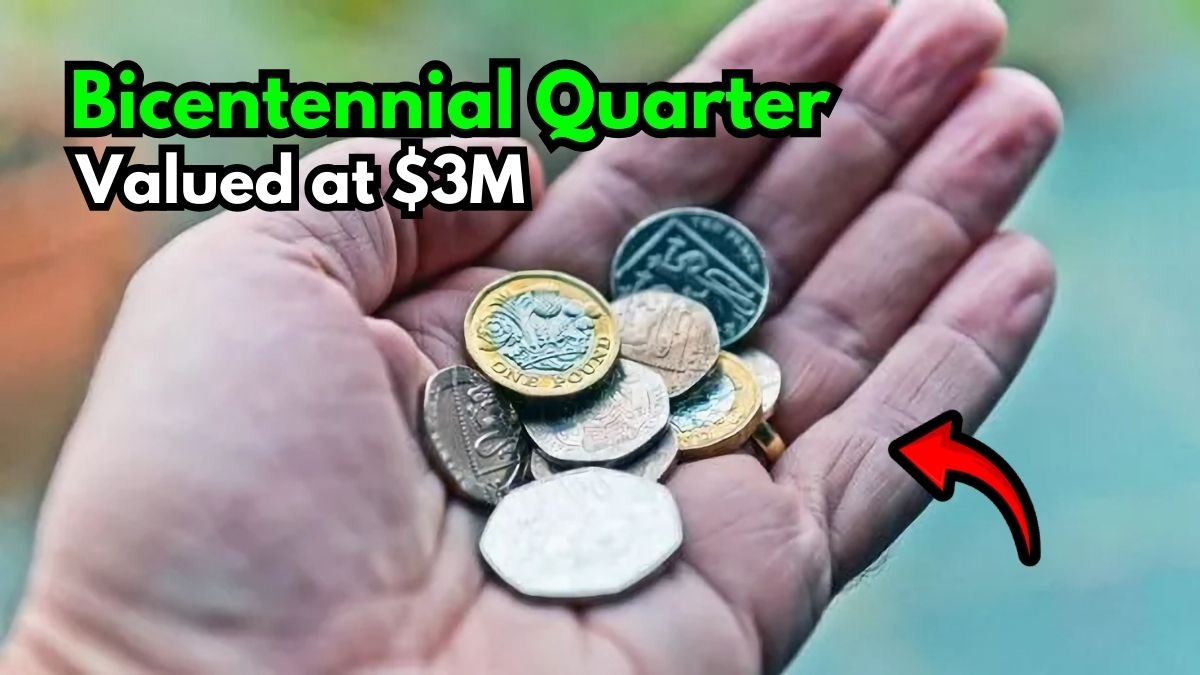Have you ever thought about whether a simple coin in your pocket might be worth millions? In the intriguing world of coin collecting, or numismatics, certain rare coins can sell for mind-boggling prices due to errors in striking, low mintage, or unique designs. Recently, the 1976 Bicentennial Quarter is worth close to 3 million USD (about 25 crores INR).
Let us now trace the history of this noteworthy coin and discuss four other kinds of quarters valued over $300,000 each for rarity and desirability in the world of coin collecting.
1976 Bicentennial Quarter – The $3 Million Treasure

Bicentennial quarters were issued in 1976 to honor the 200th birthday of American independence. On the front of the coin is a depiction of George Washington, while the back displays a colonial drummer and bears the dual dates of “1776-1976.”
Although millions of Bicentennial Quarters were struck, some coins emerged recently as exporters-struck by chance on 40% silver planchets intended only for collector proof sets.
[also read id=”1624″]
Why Is It Valuable?
- Issued on planchets containing 40% silver and meant to be used for limited collector sets
- They were accidentally released into circulation, making them an extremely rare breed
- Coins in pristine uncirculated condition will fetch prices in the stratosphere
How to Identify a Rare Bicentennial Quarter:
Check the edge of the coin: Silver quarters won’t have the copper-colored stripe that can be seen on the copper-nickel coins.
- Weighted test: Silver quarters weigh slightly more than the standard quarters.
- Authentication: If you think you got one, have it authenticated by a credible coin grading service.
1932-D Washington Quarter – A First-Year Rarity
The 1932-D Washington Quarter was minted to commemorate George Washington’s 200th birthday and marks the beginning of the Washington quarter series. This is one of the most desirable coins because it has a very limited mintage.
Why Is It Valuable?
- A mere 436,800 coins were minted in Denver, making it one of the rarest of the Washington quarters.
- Examples in high grade and uncirculated condition have sold for over $300,000 (₹2.5 crore).
- It marks the first year of the Washington quarter series, adding to its historical significance.
How to Identify a 1932-D Quarter:
- Look for the “D” mint mark on the reverse side, beneath the eagle.
- Even circulated examples have value, but uncirculated ones are the most valuable.
[also read id=”1631″]
1870-CC Liberty Seated Quarter – A Rare Piece from Carson City

The Liberty Seated Quarter series was produced from 1838 to 1891. Among these, the 1870-CC Liberty Seated Quarter stands out due to its extremely low mintage and connection to the historic Carson City Mint.
Why Is It Valuable?
- Only 8,340 coins were minted, making it one of the scarcest quarters in U.S. history.
- Coins from the Carson City Mint are especially desirable due to their historical significance.
- High-grade examples have sold for over $300,000.
How to Identify a 1870-CC Quarter:
- Check for the “CC” mint mark on the reverse side, beneath the eagle.
- Be cautious, as this coin is often counterfeited. Always seek professional authentication.
1901-S Barber Quarter – A Low-Mintage Rarity
The Barber Quarter, designed by Charles E. Barber, was minted from 1892 to 1916. The 1901-S Barber Quarter, minted in San Francisco, is one of the rarest and most coveted coins in the Barber series.
Why Is It Valuable?
- With a mintage of just 72,664 coins, it has one of the lowest production numbers in U.S. coinage history.
- High-grade examples have sold for over $300,000, and even worn examples are highly valuable.
How to Identify a 1901-S Barber Quarter:
- Look for the “S” mint mark beneath the eagle on the reverse side.
- Near-mint or uncirculated coins are the most valuable.
1823/2 Capped Bust Quarter – A Famous Minting Error

The 1823/2 Capped Bust Quarter is famous for its overdate error, where the “3” in the date was stamped over a “2.” This rare mistake occurred when the U.S. Mint reused a die from 1822 to create 1823 quarters.
[also read id=”1645″]
Why Is It Valuable?
- Only a handful of these coins exist, making it extremely rare.
- High-grade versions have sold for over $300,000 (₹2.5 crore).
- As an early U.S. minting error, it holds significant historical and collector appeal.
How to Identify the Overdate Error:
- Examine the date on the obverse (front) side. You’ll notice remnants of the underlying “2” beneath the “3.”
- A magnifying glass can help confirm the overdate error.
Comparison of Rare Quarters
| Coin | Estimated Value | Notable Feature |
|---|---|---|
| 1976 Bicentennial Quarter | Up to $3 million | Struck on a 40% silver planchet |
| 1932-D Washington Quarter | $300,000+ | First-year Washington quarter, low mintage |
| 1870-CC Liberty Seated Quarter | $300,000+ | Carson City Mint, extremely rare |
| 1901-S Barber Quarter | $300,000+ | Low mintage, highly sought after |
| 1823/2 Capped Bust Quarter | $300,000+ | Overdate error on the year |
Conclusion
Rare coins are more than just currency—they’re pieces of history and valuable collectibles. Whether it’s the 1976 Bicentennial Quarter or the 1901-S Barber Quarter, each coin has its own unique story and appeal.
FAQs
Q1. Why is the 1976 Bicentennial Quarter valuable?
A1. Some were struck on 40% silver planchets and mistakenly released into circulation, making them exceptionally rare.
Q2. How can I tell if my Bicentennial Quarter is silver?
A2. Check the edge of the coin. Silver quarters lack a copper stripe and are slightly heavier than copper-nickel quarters.
Q3. What makes the 1932-D Washington Quarter rare?
A3. It had a low mintage of just 436,800 and represents the first year of the Washington quarter series.
Q4. What is an overdate error on a coin?
A4. An overdate error occurs when a new date is stamped over a previous year’s digit, as seen in the 1823/2 Capped Bust Quarter.
Q5. Where can I sell a rare quarter?
A5. You can sell rare coins through coin auctions, certified coin dealers, or online platforms like eBay and Heritage Auctions.

